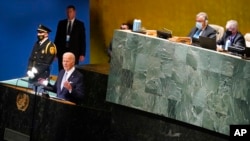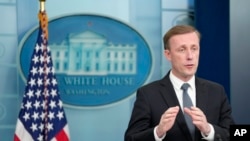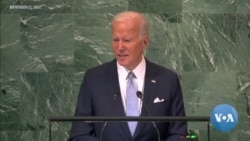With Global South leaders concerned that the war on Ukraine will again dominate the U.N. General Assembly at the expense of development challenges, U.S. President Joe Biden will use his Tuesday remarks in New York to argue that the world cannot address one without the other.
Supporting Kyiv and addressing Global South concerns such as poverty, high inflation and debt are connected goals, national security adviser Jake Sullivan told VOA on Friday during a White House briefing.
“Russia’s brutal invasion of Ukraine has caused ripple effects that impact food security, energy security and other forms of harm to countries around the world,” Sullivan said. “And so, ending this war on just terms, on the principles of sovereignty and territorial integrity, will certainly benefit not just the Ukrainian people but people everywhere.”
Ukrainian President Volodymyr Zelenskyy will be attending in person for the first time since the conflict broke out and will make his case directly to the General Assembly on Tuesday. He is set to speak at a U.N. Security Council special meeting on Ukraine on Wednesday that could place him in the same room as Foreign Minister Sergey Lavrov, who is representing Russia.
Sullivan said there were no plans for Biden to attend the Security Council meeting on Ukraine. Instead, he will host the Ukrainian leader at the White House on Thursday.
The U.S. and its allies must be able to continue to support Ukraine and provide additional economic assistance to the Global South, said former U.S. Ambassador to Ukraine John Herbst, who is now senior director of the Atlantic Council's Eurasia Center.
“Whether or not the Global South ultimately comes to understand the great stakes in stopping the Kremlin aggression in Ukraine, we can stop that aggression,” he told VOA.
Global South goals
Efforts to address Global South needs, including tackling poverty and diseases and improving access to clean water and energy, are trailing far behind the target that U.N. member countries have set for themselves through the Sustainable Development Goals (SDGs).
This year marks the halfway point between the 2015 adoption of the 17 goals - which include ending hunger, reducing inequalities and taking action on the climate crisis - and the 2030 target date for their completion. But according to one multiagency report, only 15% of those goals are on track to be met, due to climate change, economic shocks tied to the COVID-19 pandemic and the war on Ukraine.
Despite the setbacks, the Biden administration has an opportunity to embrace the SDG agenda in a way that is aligned with aspirations of the Global South, Noam Unger, director of the Sustainable Development and Resilience Initiative at the Center for Strategic and International Studies, said in a briefing to reporters Thursday.
One way to demonstrate Washington’s commitment is through voluntary national reviews, which all countries who agreed to the SDGs are supposed to do but the U.S. has not done, Unger told VOA.
Marking the beginning of a new phase of hoped-for accelerated progress, the 2023 SDG Summit will be held Monday and Tuesday on the sidelines of the General Assembly.
The Black Sea Grain Initiative will be a key focus of the summit. The now-expired deal among Russia, Ukraine, Turkey and the U.N. created a safe corridor for Ukrainian grain exports via the Black Sea and allowed for Russian food and fertilizer to reach global markets.
U.N. Secretary-General Antonio Guterres is scheduled to meet Turkish, Ukrainian and Russian leaders in New York in a bid to revive the deal, which Russia allowed to expire two months ago.
Security Council reform
Another focus of Biden’s remarks will be support for reform of the Security Council, Sullivan said.
While the U.S. has long advocated increasing the number of permanent and nonpermanent representatives, in his 2022 speech Biden said that Washington endorses not only “permanent seats for those nations we’ve long supported” — that is, Japan, Germany and India — but also “permanent seats for countries in Africa, Latin America and the Caribbean.”
Since its creation, the Security Council has had the same five permanent members: China, France, Russia, the United Kingdom and the United States. The council’s failure to act on the war on Ukraine because of Russia's wielding of its veto power has reignited decadeslong demands to overhaul the world’s premier body for efforts toward international peace and security.
Biden is also set to hold bilateral meetings on the assembly sidelines, including with Brazilian President Luiz Inacio Lula da Silva and Israeli Prime Minister Benjamin Netanyahu.
The U.S. has expressed disapproval of the Netanyahu government’s hard-line policies, including its judicial overhaul plan, which critics say is a danger to the country’s democracy.
It’s also pushing for Israel to normalize diplomatic relations with its Arab neighbors, including Saudi Arabia.
Misha Komadovsky contributed to this report.









